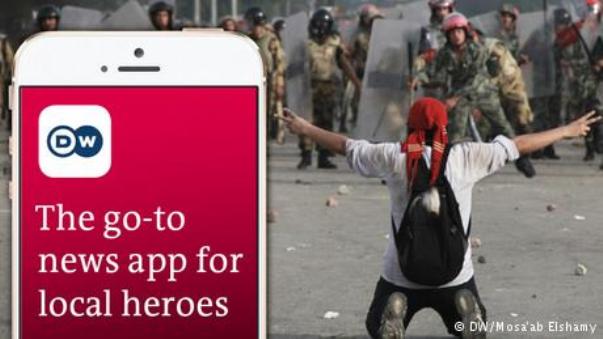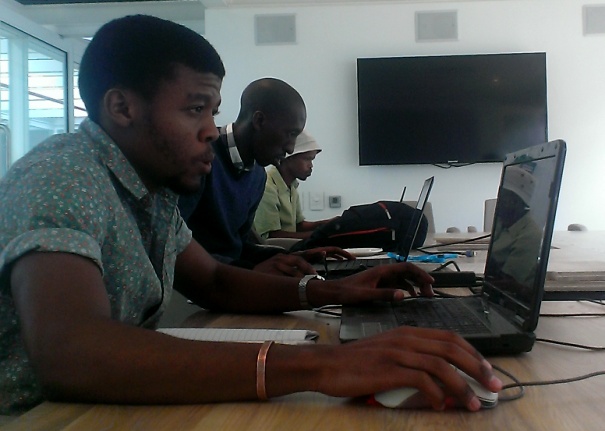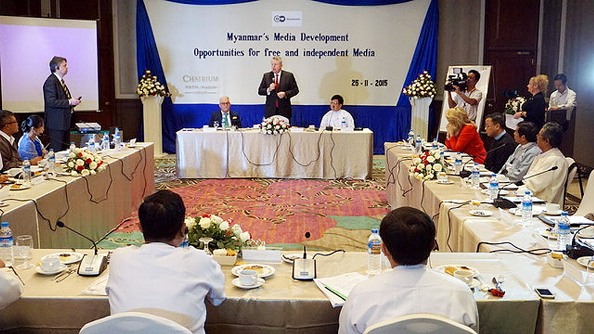Market roundup: January 2016
Mobile
The DW app has generated over 1 million downloads in the first six months since its release. The app is also among the top-ranking news apps in the Google Play Store charts for target markets like Egypt, Nigeria, Ghana and Pakistan.
South America
Chile’s leading television channel, T13, is a new DW partner and the channel’s website now includes Spanish news content from DW. T13’s is one of the most trusted sources of news in the Chilean media landscape and their online presence reflects this standard of quality. The website currently records over 5 million users and is expanding on mobile devices and social media.
Asia
DW’s English channel is now available on the Bangladeshi multi-system provider DigiJadoo as a part of its basic package. The multi-system provider serves all major cities in Bangladesh and has over 7 million subscribers.
DW is now available on three cable providers in Taiwan. NCDT, NTC-TWT and New Changhua Cable provide three provinces with international channels.
America
DW’s English channel has a new full-time partner in the USA. Ventura Broadcasting based in Fresno, California will be providing the channel on its free-to-air service to around 100,000 households.
Designing mobile news solutions for South Africa
For programming wizards and creative techies, a hackathon is where their talent can really come alive. The intense air of competition fosters collaboration and promotes innovative solutions to complex problems.
DW hosted its first African hackathon recently in Cape Town, South Africa. Three teams gathered at the innovation center Workshop 17 for a 24-hour race against time to find a solution for providing news in places with poor Internet connectivity. The problem was how to compactly package news reports for consumption on low-data devices in areas with weak networks so that they remain appealing and relevant for South African users.
The three teams were composed of established South African web designers and developers along with web design students and budding experts. The mix of participants from different parts of Cape Town allowed for unique insight into how South Africans use digital news.
The winning team developed a tool that allows user-generated content (UGC) to be easily produced and quickly disseminated. UGC is quickly becoming an important resource for news broadcasters and providing capability to those with weak networks is a valuable service.
With the hackathon, DW could foster innovation in important technologies for African users while drawing attention to its special brand of international news. The event was organized with the assistance of the South African low-data social network Mxit along with the online radio aggregator iono.fm. Logistical support was also provided by Silicon Cape and Code4Southafrica.
Using synergies to create an impact
DW has been increasing its presence in Asia by adding more broadcasting and production partners while expanding into new regions. Since the launch of DW News, Asia has taken a larger focus due to its diverse and rapidly-growing media markets.
A big piece of DW’s strategy is collaborating with partners in target regions. By building strong partnerships from the ground up, DW can reach more people across Asia with programming that speaks to them.
Representatives from DW are currently in Singapore at the Asia TV & Forum Market (ATF) to explore the potential for growth in content markets across Asia. The event is one of the largest of its kind in Asia and presents a huge opportunity for DW to open new doors and become more visible.
To open doors with audiences, DW develops regionally-tailored co-productions with local partners. Two recent deals with partners in India and Vietnam are the latest advancements for DW in Asia.
The Indian public broadcaster Prasar Bharati and the Vietnamese state broadcaster VTV both signed memorandums of understanding (MOU) to work on co-productions in the near future.
Included in the MOU with Prasar Bharati are the co-production of DW’s award-winning lifestyle show Euromaxx in Hindi and dubbing the Hindi science program Manthan into other Indian languages.
“This opens a new chapter in the Indo-German relationship where public broadcasting is concerned,” said Prasar Bharati CEO Jawhar Sircar. “We have a special relationship with Deutsche Welle and we hope it will lead to more mutually beneficial broadcasting collaborations.”
The MOU with VTV will involve co-producing a new science magazine program. Since 2013, DW has been providing Vietnamese subtitled versions of nine shows including the popular Global 3000 and In Good Shape. Since March 2015, VTV has also packaged and broadcasted a Vietnamese version of Euromaxx. VTV has also broadcast DW’s English-language channel in its entirety since 2006.
Producing content that connects with audiences in diverse markets around the world requires more than a one-size-fits-all strategy. DW has always understood this and sets an example for international cooperation in broadcasting that diversifies programming and brings new ideas and perspectives to viewers.
Market roundup: December 2015
Mobile
Downloads for the DW app have grown immensely in recent months. The number of total downloads is currently at around 850,000 – a big leap from 250,000 in September. The app was launched in June to accompany the launch of DW’s international news channel.
Middle East
A campaign for DW Arabia is showing a lot of success in Morocco, Egypt and Iraq, the three largest media markets in the Arab world. Indicators include a video trailer on YouTube and Facebook that already has over 1 million views. The campaign highlights the credibility and transparency of DW’s programming against other broadcasters, whose reporting can fall into sensationalism. DW Arabia also explores taboos in the Arab world, which are avoided by other regional broadcasters. The “Discover the Difference” campaign will run until the end of the year.
Asia
DW has a new partner in Indonesia. Cable provider Dens TV is now carrying the complete program of DW’s English channel for audiences in Jakarta.
Building a free press from the ground up in Myanmar
With the change in government in Myanmar, a new broadcasting act is to be put in place that will allow private television broadcasting for the first time in the history of the country.
It is a critical time for Myanmar, which had been ruled by military dictatorship from 1962 to 2011, and with former military leaders continuing to maintain power in parliament since that time. After a parliamentary election on November 8, the NLD party that supports liberal democratic values won a landslide majority vote and now has the mandate to govern.
The importance of a free media in developing liberal public institutions will make itself very apparent in the near future and the level of press freedom that will actually be allowed is something to monitor. Myanmar currently ranks 144th out of 180 nations on the Reporters Without Borders Press Freedom Index. Harassment and imprisonment of journalists was widespread in Myanmar as recently as 2014.
This is why institutions like DW Akademie can make a huge difference. As Germany’s largest media development organization, it has been deeply engaged in media development in Myanmar since 2012. With the changes in the past year, DW Akademie’s activites in Myanmar have been greatly expanded. In October 2015, DW Akademie worked in cooperation with the United Nations Development Programme (UNDP) and organized a series of workshops to introduce how community broadcasting works. Myanmar also elected a press council and DW Akademie representatives attended the ceremony. Earlier in 2015, DW Akdemie organized a training program for local journalism teachers that will help support the development of local media and promote a culture of quality media at its roots.
DW has also been a consistent trusted advisor to the state broadcaster MRTV and in 2014 helped found the Myanmar Journalism Institute, the first private journalism school in Myanmar. At a recent event, organized by DW Akademie in Yangon, DW’s Director General Peter Limbourg met with media representatives to discuss the opportunities and challenges of the transition.
There has also been criticism of a 2014 News Media Law in Myanmar from the free speech watchdog Article 19, with the safeguards for media freedom being,”heavily qualified and insufficient to meet international standards.” The media situation began to look better on paper, but according to Article 19, the laws often relied on imprecise legal language that doesn’t fully guarantee freedom of expression.
Besides the trappings of governance, there is also the issue of developing a confident and effective media culture in Myanmar, so that journalists know how to do their jobs and take advantage of their potential new freedoms.
Though the transition into a free media market will be a bumpy ride for broadcasters and other media operators in Myanmar, an essential aspect of quality journalism begins from the ground up. If journalists posses skills and resources, combined with freedom to report and produce stories that have a positive effect on the social development of Myanmar, the business side of the problem could have less of an adverse impact. If the new government continues a legacy of bureaucratic and back-door control of the media, it will say a lot about where the country is heading.











Feedback